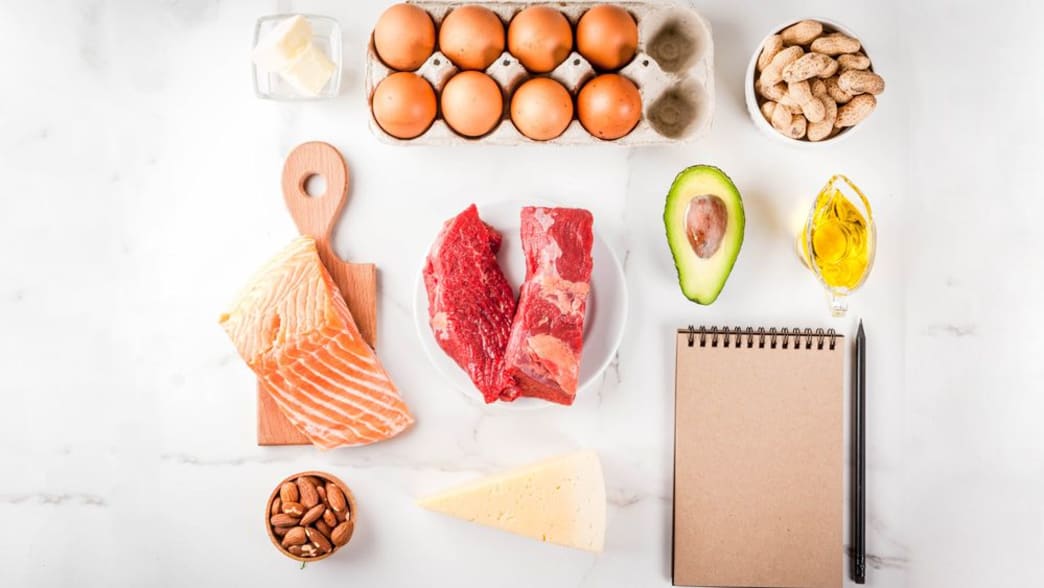When you’re set on making a change to your diet with the aim of losing weight or getting healthier, it’s a good idea to consider both the short and long term. While an extreme change that promises dramatic weight loss by cutting out entire food groups and dropping your calorie intake massively might seem appealing, without sustaining the changes any drop on the scales is likely to be reversed – and even if you do stick with it there could be serious long-term consequences.
We mention this because following the ketogenic diet certainly falls into the category of an extreme change for most people due to the restrictions it places on your carbohydrate intake. You should ensure you get all the info you can on keto eating before trying it, so we spoke to Dr Luke Powles, associate clinical director for Bupa UK, for his assessment of the diet. And the one thing to do if you are considering it? “Get your health checked first, or speak with your GP or a qualified dietitian,” says Powles. Read on to find out why.

In the ketogenic diet you significantly reduce the amount of carbohydrates you consume, so that your body switches from burning carbohydrates to burning fat for energy. Because it lacks carbohydrates, a ketogenic diet is rich in proteins and fats so your diet will typically include plenty of meats, eggs, cheeses, fish, nuts and butter. There are many versions of the keto diet, but all typically ban or drastically reduce carb-rich foods such as bread, pasta, rice, cereals and starchy vegetables like sweet potatoes and corn.
While it’s true that you may be able to lose weight in the short term, a diet this restrictive is hard to stick to. Although burning fat seems like an ideal way to lose a few pounds, the keto diet relies on ketone bodies, a type of fuel that the liver produces from stored fat. And getting the liver to make these ketone bodies can be tricky.
A keto diet requires you to eat fewer than 20 to 50 grams of carbohydrates each day. To put this into perspective, a medium-sized banana has around 27 grams of carbohydrates. There has been limited research into this diet too – many of the studies conducted have had a small number of participants or were short-term. It can also be heavy on red meat, along with other fatty, processed and salty foods that are notoriously unhealthy.
If you’re not eating a wide variety of fruits, vegetables and grains, you’ll be missing out on key micronutrients and vitamins, including magnesium and vitamins B and C. You may also experience low energy, hunger and fatigue if you restrict your carbohydrate intake, and you can feel irritated and constipated too.
Carbohydrates are our body’s main source of energy. We use them to fuel activity in our muscles, and to keep our brain and other organs working properly. By drastically cutting carbohydrate-containing foods, you’re likely to miss out on the nutritional benefits of healthy choices like fruit, legumes and starchy vegetables. Rather than eliminating carbs from your diet, the key is to eat the right type of carbohydrate because some are healthier than others. “Good carbs” are the wholegrain varieties of starchy carbohydrates, such as wholegrain bread and brown rice. These contain lots of important nutrients that may reduce your risk of heart disease and some types of cancer, and they’re also more likely to keep you feeling fuller for longer.
If you are considering this diet, you should get your health checked first, or speak with your GP or a qualified dietitian, in case this diet isn’t suitable for you.
It’s easy to be tempted by extreme diet trends to lose weight, especially when you want a fresh start in the new year, but keto isn’t sustainable or healthy in the long term. A balanced, unprocessed diet that’s rich in fruits, vegetables, lean meats and fish, coupled with regular exercise, will help you to lose weight safely.
Written by Nick Harris-Fry for Coach and legally licensed through the Matcha publisher network. Please direct all licensing questions to legal@getmatcha.com.
Featured image provided by Coach
Kalahari Snacks began after the adventure of a lifetime, when best friends traveled to South Africa and raced 175 miles in an Ironman and Ultramarathon within a week. There we discovered the age-old traditions of crafting and preserving beef with simple ingredients.
Since then, we’ve been rooted in our mission to share these styles and elevate the way people experience food.
Get 10% off your first order!